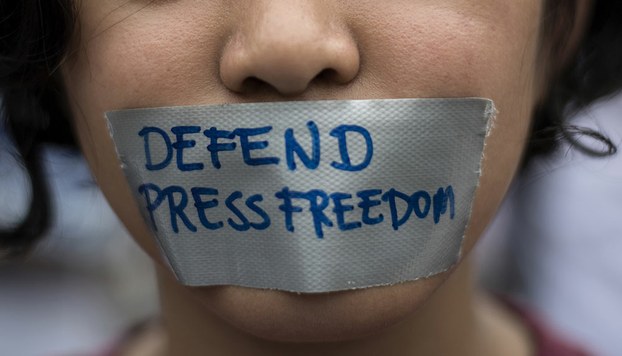As the world fights a pandemic, journalism has never been more essential

Recently, amid mounting global skepticism, China finally revised its official count of coronavirus fatalities in Wuhan — the pandemic’s initial epicenter — upward by 50 percent, adding 1,290 deaths to bring it to 3,869.
Chinese Foreign Ministry spokesman Zhao Lijian, who earlier had peddled a discredited conspiracy that the United States introduced the virus in China, insisted this revision was nothing more than data catching up with reality, not the reaction to a cover-up. However, the revision notably occurred after a series of media articles, led by Radio Free Asia, came out questioning the official number. RFA’s reporters had concluded over a month ago, after analyzing the sheer numbers of cremated remains coming from the region’s seven main funeral homes, that the Wuhan death toll was likely closer to 42,000 — over 10 times more than the official count.
This is just one of many examples of the free press calling China’s Communist Party to account for its lack of transparency. But during this international public health crisis, the role of the press has become more essential than ever. By pursuing the truth, journalism stands in the way of the CCP and authoritarian rulers in other countries deceiving their publics over their handling of COVID-19. Independent reporting is necessary to keep citizens informed and help the international community tackle a virus transcending political affiliations and national boundaries.
Chinese authorities took extraordinary steps to suppress information about the virus at the start of the outbreak. Reporters Without Borders (RSF) documented the lost opportunities that government officials, public health personnel, and state-controlled media in China had to alert the wider public to a potential epidemic — and potentially save lives.
Instead, Chinese authorities have lashed out, punishing researchers, doctors, and lawyers who shared information that disputed official claims. In March, as the outbreak raged, China even resorted to expelling foreign correspondents from the Wall Street Journal, New York Times, and Washington Post, as well as from the Voice of America — RFA’s sister network.
China’s official mouthpiece Global Times justified this extraordinary action as a response to what the CCP saw as unfavorable coverage of the demonstrations in Hong Kong and the mass internment of Uyghurs in western China, as well as an unflattering portrayal of China’s official missteps in addressing the coronavirus outbreak.
Growing distrust with state media resulted in many people in China seeking news from independent sources. “We can’t tell whether there are new cases in hospitals or not. But local officials are sure to be covering up the truth,” a Wuhan resident told RFA a month ago as authorities enforced an information lockdown. During the first three months of the year, when the outbreak was at its worst in China, RFA’s Mandarin Service — which has been closely reporting on the virus’ progress and human toll — saw a dramatic increase of visits to its website and engagement on social media, with a 400 percent increase in video views on Facebook over October-December 2019.
Since botching the initial containment of the virus, China has attempted to spin its response to the outbreak as a model worth emulating. Despite the touted success of its “mask diplomacy,” the transactional nature of China’s aid — offering services and resources to countries in exchange for influence — and its global PR campaign have been met with skepticism from analysts, public health experts, and world leaders. Its distribution of medical supplies and PPE have been marred by defective products.
France’s Emmanuel Macron told The Financial Times that it is “naive” to trust China’s self-assessment of its handling of the disease. The racist treatment of African citizens in Chinese cities, reportedly encouraged by authorities, during the COVID-19 outbreak recently spawned a backlash among African leaders who once eagerly embraced China’s support.
In RFA’s broadcast countries beyond China, all of which are under varying degrees of authoritarian rule, governments have kept a tight grip on information and used the pandemic to consolidate control. Cambodia has passed a law that would allow Prime Minister Hun Sen to assume sweeping emergency powers — this from a leader who has already squelched independent media and any opposition that could threaten his 35-year rule. The law would allow complete surveillance authority over telecommunications and control of social media and the press.
RFA learned that despite Pyongyang’s claims that North Korea remains free of the disease, government authorities have been lecturing local community groups about confirmed COVID-19 cases in three of the country’s regions.
These actions shouldn’t come as a surprise given that the governments of these countries have long embraced China’s model of suppressing information, no matter the public need.
But this time, their stance is dangerously irresponsible, not only to their own citizens but to the global community. Policy-makers and medical personnel battling a virus that knows no borders need reliable figures about the rate of infections, the effectiveness of treatments, availability of supplies, and other key data to make the best possible decisions. Journalists, not propagandists, are the ones to ensure that decision-makers and citizens alike possess that knowledge.
As we mark World Press Freedom Day during one of humanity’s most challenging moments, it’s crucial that we consider the consequential role that journalists play. Reporters, editors, and all assisting the effort to keep us informed are also “essential workers” during a crisis, especially one of this magnitude. Our mission — despite threats, intimidation, and censorship — must never cease, as long as there is truth and the public good to be defended.

